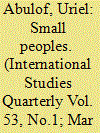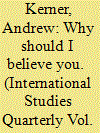|
|
|
Sort Order |
|
|
|
Items / Page
|
|
|
|
|
|
|
| Srl | Item |
| 1 |
ID:
087583


|
|
|
|
|
| Publication |
2009.
|
| Summary/Abstract |
This article aims to advance our understanding of the development of English School thinking on international ethics by outlining three phases of ethical inquiry within the British Committee. The article argues that, throughout the life of the Committee, its outlook was conditioned by a pervading moral skepticism, which was reflected in the School's commitment to a "middle-ground ethics"; however, at various times the Committee members' views changed about how maximalist the "good" could be that oriented this ethical position. Awareness of this ebb and flow helps us better understand Hedley Bull's characterization of the ethics of pluralism and solidarism within the School as well as the precise challenge contemporary English School theorists face if they are to move beyond the normative cul-de-sac that British Committee members encountered in each phase of their ethical discussions.
|
|
|
|
|
|
|
|
|
|
|
|
|
|
|
|
| 2 |
ID:
087579


|
|
|
|
|
| Publication |
2009.
|
| Summary/Abstract |
Democratic and autocratic states routinely violate their international agreements protecting human rights. Scholars typically link ratification and compliance behavior theoretically but test their models separately; however, if the behaviors are jointly determined then we should treat them that way empirically. We consider how domestic judiciaries influence the joint choice to ratify and comply with international human rights regimes. Using data on the ratification status of states under the Convention Against Torture (CAT), states' torture practices, and a series of measures of judicial effectiveness, we examine whether legal institutions are likely to constrain state behavior and by implication raise the costs of ratification.
|
|
|
|
|
|
|
|
|
|
|
|
|
|
|
|
| 3 |
ID:
087580


|
|
|
|
|
| Publication |
2009.
|
| Summary/Abstract |
Previous research concerning the relationship between conflict and public health finds that countries emerging from war face greater challenges in ensuring the well-being of their populations in comparison with states that have enjoyed political stability. This study seeks to extend this insight by considering how different civil war conflict strategies influence post-conflict public health. Drawing a distinction between deaths attributable to battle and those fatalities resulting from genocide/politicide, we find that the magnitude of genocide/politicide proves the more effective and consistent predictor of future rates of disability and death in the aftermath of civil war. The implications of this research are twofold. First, it lends support to an emerging literature suggesting that important distinctions exist between the forms of violence occurring during civil war. Second, of particular interest to policymakers, it identifies post-civil war states that have experienced the highest rates of genocide/politicide as the countries most in need of assistance in the aftermath of conflict.
|
|
|
|
|
|
|
|
|
|
|
|
|
|
|
|
| 4 |
ID:
087570


|
|
|
|
|
| Publication |
2009.
|
| Summary/Abstract |
Increasingly, scholars have taken note of the tendency for women to conceptualize issues such as security, peace, war, and the use of military force in different ways than their male counterparts. These divergent conceptualizations in turn affect the way women interact with the world around them and make decisions. Moreover, research across a variety of fields suggests that providing women a greater voice in international negotiations may bring a fresh outlook to dispute resolution. Using experimental data collected by the GlobalEd Project, this article provides substantial support for hypotheses positing that females generate significantly different processes and outcomes in a negotiation context. These findings occur both in terms of female negotiation behavior and the impact of females as negotiation facilitators/mediators.
|
|
|
|
|
|
|
|
|
|
|
|
|
|
|
|
| 5 |
ID:
087567


|
|
|
|
|
| Publication |
2009.
|
| Summary/Abstract |
Selection effects make it difficult to determine whether concern for other people genuinely affects individuals' policy preferences. Child gender provides a conveniently exogenous means of exploring the issue, especially in contexts such as military policy where girls and boys face different risks; in many countries male children are disproportionately likely to become soldiers and thus bear the costs of militarism. This creates divergent effects: those in households with girls generally prefer more hawkish foreign policies than do members of households with boys. Data from the 2004 American National Election Study confirm these intuitions, both in general statements of policy preference and in evaluating the net costs of the Afghanistan and Iraq conflicts.
|
|
|
|
|
|
|
|
|
|
|
|
|
|
|
|
| 6 |
ID:
087576


|
|
|
|
|
| Publication |
2009.
|
| Summary/Abstract |
Democracies trade more with other democracies than they trade with closed political systems, but why they do so is unclear. We present a "gravity equation" that disentangles foreign policy from country-specific influences on trade by adding explanatory variables to control for traits of both the mass public and the domestic political system. We apply the resulting model to a data set covering 50 years (1948-1997) and 72 countries. The estimated effect of joint democracy, which appears in the absence of the country-specific variables, drops out when these control variables are added to eliminate omitted variable bias. Democracies do not trade together any more than they would incidentally given the usual social, economic, and political influences on commercial activity, calling into question explanations for their mutual trade activity that rely on foreign-policy favoritism or institutional compatibility.
|
|
|
|
|
|
|
|
|
|
|
|
|
|
|
|
| 7 |
ID:
087572


|
|
|
|
|
| Publication |
2009.
|
| Summary/Abstract |
Research indicates that if third parties provide assistance to sanctioned states, the sanctions are less likely to be successful. However, the scholarship on the profile of sanctions busters and their motivations remains underdeveloped. Drawing on the realist and liberal paradigms, this piece develops two competing theories to account for third-party sanctions-busting. The hypotheses drawn from these theories build upon existing work on sanctions, the political determinants of international trade, and the effects of indirect interstate relationships. A quantitative analysis develops a new measure to identify sanctions-busting behavior for a dataset covering 77 sanctions cases from 1950 to 1990. The liberal and realist explanations are then tested. The results offer strong support for the liberal theory of sanctions-busting and less support for the realist theory. In particular, the analysis reveals a counter-intuitive finding that a sender's close allies are more likely to sanctions-bust on the target's behalf than are other states.
|
|
|
|
|
|
|
|
|
|
|
|
|
|
|
|
| 8 |
ID:
087587


|
|
|
|
|
| Publication |
2009.
|
| Summary/Abstract |
This exploratory paper attempts to extend the boundaries of research on the "smallness" of polities. It introduces the concept of "small peoples," a term coined by Czech author Milan Kundera to denote communities that lack a "sense of an eternal past and future." The paper posits "small peoples" as ethnic communities characterized by prolonged and deep-rooted uncertainty regarding their own existence. I argue that in modern times, "small peoples" doubt the validity of their past-based ethnic identity and the viability of their future-driven national polity. Empirically, I analyze two distinct "small peoples"-Israeli Jews and French Canadians (Québécois)-and argue that while the former have been more concerned with the future survival of their polity, the latter have been more concerned with insecurity about their identity. The paper suggests that a focus on communities and their intersubjective processes can enrich the study of states and their objective state.
|
|
|
|
|
|
|
|
|
|
|
|
|
|
|
|
| 9 |
ID:
087577


|
|
|
|
|
| Publication |
2009.
|
| Summary/Abstract |
Do terrorist attacks by transnational groups lead governments to restrict human rights? Conventional wisdom holds that governments restrict rights to forestall additional attacks, to more effectively pursue suspected terrorists, and as an excuse to suppress their political opponents. But the logic connecting terrorist attacks to subsequent repression and the empirical research that addresses this issue suffer from important flaws. We analyze pooled data on the human rights behavior of governments from 1981 to 2003. Our key independent variable of interest is transnational terrorist attacks, and the analysis also controls for factors that existing studies have found influence respect for human rights. Repeated terrorist attacks lead governments to engage in more extrajudicial killings and disappearances, but have no discernable influence on government use of torture and of political imprisonment or on empowerment rights such as freedom of speech, assembly, and religion. This finding has important implications for how we think about the effects of terrorism and the policy responses of states, non-governmental organizations, and international institutions interested in protecting human rights.
|
|
|
|
|
|
|
|
|
|
|
|
|
|
|
|
| 10 |
ID:
087574


|
|
|
|
|
| Publication |
2009.
|
| Summary/Abstract |
Bilateral Investment Treaties (BITs) are the primary legal mechanism protecting foreign direct investment (FDI) around the world. BITs are thought to encourage FDI by establishing a broad set of investor's rights and by allowing investors to sue a host state in an international tribunal if these rights are violated. Perhaps surprisingly, the empirical literature connecting BITs to FDI flows has produced conflicting results. Some papers have found that BITs attract FDI, while others have found no relationship or even that BITs repel FDI. I suggest in this paper that these results stem from statistical models that do not fully capture the causal mechanisms that link BITs to FDI. Extant literature has often suggested that BITs may encourage investment from both protected and unprotected investors, yet the literature has not allowed for a full evaluation of this claim. This paper explores the theoretical underpinnings and empirical implications of an institution that works in these direct and indirect ways, and offers a statistical test that is capable of distinguishing between the two. The results indicate that: (1) BITs attract significant amounts of investment; (2) BITs attract this investment from protected and unprotected investors; and (3) these results are obscured by endogeneity unless corrected for in the statistical model.
|
|
|
|
|
|
|
|
|
|
|
|
|
|
|
|
|
|
|
|
|